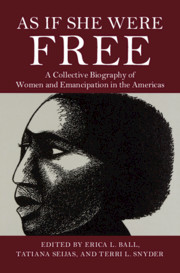Book contents
- As If She Were Free
- As If She Were Free
- Copyright page
- Dedication
- Contents
- Figures
- Contributors
- Elizabeth Catlett and the Form of Emancipation
- Acknowledgments
- Introduction
- Part I Claiming Emancipation during the Rise of New World Slavery
- Part II Experiencing Freedom during Slavery’s Expansion
- Part III Envisaging Emancipation during Second Slavery
- 14 Bessy Chambers, Nineteenth-Century Jamaica
- 15 Minerva, Nineteenth-Century Téjas and Louisiana (US), and Mexico
- 16 Cécile Fatiman and Petra Carabalí, Late Eighteenth-Century Haiti and Mid-Nineteenth-Century Cuba
- 17 Mary Ellen Pleasant, Nineteenth-Century Massachusetts and California (US)
- 18 Gabriela, Nineteenth-Century Rio Grande do Sul (Brazil)
- 19 Maria Firmina dos Reis, Nineteenth-Century Maranhão (Brazil)
- Part IV Enacting Emancipation in the Aftermath of Slavery
- Bibliography
- Index
16 - Cécile Fatiman and Petra Carabalí, Late Eighteenth-Century Haiti and Mid-Nineteenth-Century Cuba
from Part III - Envisaging Emancipation during Second Slavery
Published online by Cambridge University Press: 24 September 2020
- As If She Were Free
- As If She Were Free
- Copyright page
- Dedication
- Contents
- Figures
- Contributors
- Elizabeth Catlett and the Form of Emancipation
- Acknowledgments
- Introduction
- Part I Claiming Emancipation during the Rise of New World Slavery
- Part II Experiencing Freedom during Slavery’s Expansion
- Part III Envisaging Emancipation during Second Slavery
- 14 Bessy Chambers, Nineteenth-Century Jamaica
- 15 Minerva, Nineteenth-Century Téjas and Louisiana (US), and Mexico
- 16 Cécile Fatiman and Petra Carabalí, Late Eighteenth-Century Haiti and Mid-Nineteenth-Century Cuba
- 17 Mary Ellen Pleasant, Nineteenth-Century Massachusetts and California (US)
- 18 Gabriela, Nineteenth-Century Rio Grande do Sul (Brazil)
- 19 Maria Firmina dos Reis, Nineteenth-Century Maranhão (Brazil)
- Part IV Enacting Emancipation in the Aftermath of Slavery
- Bibliography
- Index
Summary
This essay follows in the footsteps of two women, Cecile Fatiman and Petra Carabalí, to explore the convergence between sacred space, embodied archives, and slave insurgent movements during the eighteenth and nineteenth centuries. Cecile Fatiman was the mambo, or Vodun priestess, who famously presided over the Bois-Caiman ceremony that ignited the Haitian Revolution. Though relatively unknown to historians, Petra Carabalí helped to produce a momentous ritual that erupted during the 1844 slave movement in Cuba. Cecile and Petra’s stories demonstrate that enslaved women were critical participants in several important rituals that became catalysts for organized rebellion. This chapter examines the gendered politics of these ritual spaces and the role of sacred dance in producing a larger insurgent culture. It demonstrates the ways in which ritual activities enabled enslaved people to nourish organic political cultures, reclaim violated bodies, and engage a larger Atlantic ethos of freedom. Ultimately, it uses ritual space and sacred dance as alternative archives to reconceptualize how enslaved people imagined, enacted, and lived their freedom.
- Type
- Chapter
- Information
- As If She Were FreeA Collective Biography of Women and Emancipation in the Americas, pp. 293 - 311Publisher: Cambridge University PressPrint publication year: 2020
- 2
- Cited by



